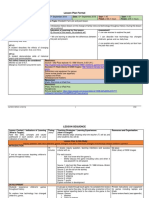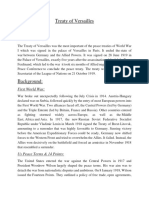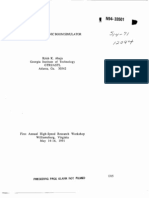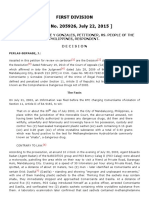5 A Flawed Peace
5 A Flawed Peace
Uploaded by
ajf1173Copyright:
Available Formats
5 A Flawed Peace
5 A Flawed Peace
Uploaded by
ajf1173Original Title
Copyright
Available Formats
Share this document
Did you find this document useful?
Is this content inappropriate?
Copyright:
Available Formats
5 A Flawed Peace
5 A Flawed Peace
Uploaded by
ajf1173Copyright:
Available Formats
Page 1 of 4
A Flawed Peace
MAIN IDEA
POWER AND AUTHORITY After winning the war, the Allies dictated a harsh peace settlement that left many nations feeling betrayed.
WHY IT MATTERS NOW
Hard feelings left by the peace settlement helped cause World War II.
TERMS & NAMES
self Woodrow determination Wilson Treaty of Georges Versailles Clemenceau Fourteen Points League of Nations
SETTING THE STAGE World War I was over. The killing had stopped. The
terms of peace, however, still had to be worked out. On January 18, 1919, a conference to establish those terms began at the Palace of Versailles, outside Paris. Attending the talks, known as the Paris Peace Conference, were delegates representing 32 countries. For one year, this conference would be the scene of vigorous, often bitter debate. The Allied powers struggled to solve their conflicting aims in various peace treaties.
TAKING NOTES
Clarifying Use a chart to record the reaction by various groups to the Treaty of Versailles. Reaction to Treaty Germany Africans & Asians Italy y & Japan
The Allies Meet and Debate
Despite representatives from numerous countries, the meetings major decisions were hammered out by a group known as the Big Four: Woodrow Wilson of the United States, Georges Clemenceau of France, David Lloyd George of Great Britain, and Vittorio Orlando of Italy. Russia, in the grip of civil war, was not represented. Neither were Germany and its allies.
Wilsons Plan for Peace In January 1918, while the war was still raging, President Wilson had drawn up a series of peace proposals. Known as the Fourteen Points, they outlined a plan for achieving a just and lasting peace. The first four points included an end to secret treaties, freedom of the seas, free trade, and reduced national armies and navies. The fifth goal was the adjustment of colonial claims with fairness toward colonial peoples. The sixth through thirteenth points were specific suggestions for changing borders and creating new nations. The guiding idea behind these points was self-determination. This meant allowing people to decide for themselves under what government they wished to live. Finally, the fourteenth point proposed a general association of nations that would protect great and small states alike. This reflected Wilsons hope for an organization that could peacefully negotiate solutions to world conflicts. The Versailles Treaty As the Paris Peace Conference opened, Britain and
France showed little sign of agreeing to Wilsons vision of peace. Both nations were concerned with national security. They also wanted to strip Germany of its war-making power. The differences in French, British, and U.S. aims led to heated arguments among the nations leaders. Finally a compromise was reached. The Treaty of Versailles
858 Chapter 29
Page 2 of 4
Vocabulary
Reparations is money paid by a defeated nation to compensate for damage or injury during a war.
between Germany and the Allied powers was signed on June 28, 1919, five years to the day after Franz Ferdinands assassination in Sarajevo. Adopting Wilsons fourteenth point, the treaty created a League of Nations. The league was to be an international association whose goal would be to keep peace among nations. The treaty also punished Germany. The defeated nation lost substantial territory and had severe restrictions placed on its military operations. As tough as these provisions were, the harshest was Article 231. It was also known as the war guilt clause. It placed sole responsibility for the war on Germanys shoulders. As a result, Germany had to pay reparations to the Allies. All of Germanys territories in Africa and the Pacific were declared mandates, or territories to be administered by the League of Nations. Under the peace agreement, the Allies would govern the mandates until they were judged ready for independence.
Woodrow Wilson 18561924
Wilson was tall and thin and often in poor health. He suffered from terrible indigestion and sometimes had to use a stomach pump on himself. A scholarly man, Wilson once served as president of Princeton University in New Jersey. Passionate about international peace, he took on the U.S. Senate after it vowed to reject the Treaty of Versailles. During the political battle, he suffered a stroke that disabled him for the rest of his term.
Georges Clemenceau 18411929
The near opposite of Wilson, Clemenceau had a compact physique and a combative style that earned him the nickname Tiger. He had worked as a physician and journalist before entering the political arena. Determined to punish Germany, Clemenceau rarely agreed with Wilson and his larger quest for world peace. He once remarked of Wilson, He thinks he is another Jesus Christ come upon earth to reform men.
A Troubled Treaty
The Versailles treaty was just one of five treaties negotiated by the Allies. In the end, these agreements created feelings of bitterness and betrayalamong the victors and the defeated.
The Creation of New Nations The Western powers signed separate peace treaties in 1919 and 1920 with each of the other defeated nations: Austria-Hungary, Bulgaria, and the Ottoman Empire. These treaties, too, led to huge land losses RESEARCH LINKS For more on Woodrow for the Central Powers. Several new countries were Wilson and Georges Clemenceau, go to created out of the Austro-Hungarian Empire. classzone.com Austria, Hungary, Czechoslovakia, and Yugoslavia were all recognized as independent nations. The Ottoman Turks were forced to give up almost all of their former empire. They retained only the territory that is today the country of Turkey. The Allies carved up the lands that the Ottomans lost in Southwest Asia into mandates rather than independent nations. Palestine, Iraq, and Transjordan came under British control; Syria and Lebanon went to France. Russia, which had left the war early, suffered land losses as well. Romania and Poland both gained Russian territory. Finland, Estonia, Latvia, and Lithuania, formerly part of Russia, became independent nations. A Peace Built on Quicksand In the end, the Treaty of Versailles did little to build a lasting peace. For one thing, the United Statesconsidered after the war to be the dominant nation in the worldultimately rejected the treaty. Many Americans objected to the settlement and especially to President Wilsons League of Nations. Americans believed that the United States best hope for peace was to stay out of European affairs. The United States worked out a separate treaty with Germany and its allies several years later.
The Great War 859
Page 3 of 4
58 N
Europe Pre-World War I
8W
16E
32E
Oslo
8E
48E
40E
24E
NORWAY
St. Petersburg
Stockholm
SWEDEN
50 N
GREAT BRITAIN
North Sea
DENMARK Copenhagen
B altic Se a
R U S S I A
London
NETH. Amsterdam Brussels BELGIUM
Berlin
GERMANY
LUX.
ATLANTIC OCEAN
Paris
42
FRANCE
N
Bern SWITZ.
Vienna
AUSTRIAHUNGARY
Belgrade SERBIA MONTENEGRO Rome Tirane ALBANIA ROMANIA Bucharest Sofia BULGARIA
PORTUGAL
Madrid
ANDORRA
ITALY
Black Sea
SPAIN
Constantinople (Istanbul)
Medite
34N
0 0
400 Miles
rran
ean
GREECE
OTTOMAN EMPIRE
Athens
Se
800 Kilometers
16E
Europe Post-World War I
8W
W 16
NORWAY
Oslo
8E
FINLAND
Helsinki Tallinn ESTONIA Riga LATVIA LITHUANIA
24E
SWEDEN
Stockholm
E 48
40E
32E
Moscow
50 N
IRELAND Dublin
GREAT BRITAIN
London
N o r th S ea
DENMARK Copenhagen
Baltic Sea
NETH. Amsterdam Brussels BELGIUM LUX.
Kaunas DANZIG E. PRUSSIA (Germany) Berlin Warsaw
S O V I E T U N I O N
GERMANY
Prague
ATLANTIC OCEAN
POLAND
S LOVAKIA
Budapest
Paris
SAAR Bern SWITZ.
CZ
ECHO
Vienna AUSTRIA HUNGARY
42
FRANCE
N
YU
ROMANIA
G
Bucharest
PORTUGAL
Madrid
ANDORRA
ITALY
Rome
SL
Belgrade
AV
IA
BULGARIA Sofia
Black Sea
Tirane ALBANIA GREECE Athens
Ankara
Mediterranean
34N
0 0 400 Miles 800 Kilometers
Sea
TURKEY
GEOGRAPHY SKILLBUILDER: Interpreting Maps
1. Region Which Central Powers nation appears to have lost the most territory? 2. Location On which nations former lands were most of the new countries created?
860
Page 4 of 4
The Treaty of Versailles: Major Provisions
League of Nations
International peace organization; enemy and neutral nations initially excluded Germany and Russia excluded
Territorial Losses
Germany returns Alsace-Lorraine to France; French border extended to west bank of Rhine River Germany surrenders all of its overseas colonies in Africa and the Pacific
Military Restrictions
Limits set on the size of the German army Germany prohibited from importing or manufacturing weapons or war material Germany forbidden to build or buy submarines or have an air force
War Guilt
Sole responsibility for the war placed on Germanys shoulders Germany forced to pay the Allies $33 billion in reparations over 30 years
SKILLBUILDER: Interpreting Charts
1. Analyzing Issues In what ways did the treaty punish Germany? 2. Clarifying What two provinces were returned to France as a result of the treaty?
Analyzing Issues What complaints did various mandated countries voice about the Treaty of Versailles?
In addition, the treaty with Germany, in particular the war-guilt clause, left a legacy of bitterness and hatred in the hearts of the German people. Other countries felt cheated and betrayed by the peace settlements as well. Throughout Africa and Asia, people in the mandated territories were angry at the way the Allies disregarded their desire for independence. The European powers, it seemed to them, merely talked about the principle of national self-determination. European colonialism, disguised as the mandate system, continued in Asia and Africa. Some Allied powers, too, were embittered by the outcome. Both Japan and Italy, which had entered the war to gain territory, had gained less than they wanted. Lacking the support of the United States, and later other world powers, the League of Nations was in no position to take action on these and other complaints. The settlements at Versailles represented, as one observer noted, a peace built on quicksand. Indeed, that quicksand eventually would give way. In a little more than two decades, the treaties legacy of bitterness would help plunge the world into another catastrophic war.
SECTION
ASSESSMENT
TERMS & NAMES 1. For each term or name, write a sentence explaining its significance.
Woodrow Wilson Georges Clemenceau Fourteen Points self-determination Treaty of Versailles League of Nations
USING YOUR NOTES
2. Which group was most
MAIN IDEAS
3. What was the goal of Woodrow
CRITICAL THINKING & WRITING
6. FORMING OPINIONS Were the Versailles treaties fair?
justified in its reaction to the treaty? Why?
Reaction to Treaty Germany Africans & Asians Italy y & Japan
Wilsons Fourteen Points?
4. What was the war guilt clause
Consider all the nations affected.
7. ANALYZING MOTIVES Why might the European Allies have
in the Treaty of Versailles?
5. Why did the United States
been more interested in punishing Germany than in creating a lasting peace?
8. EVALUATING DECISIONS Was the United States right to
reject the Treaty of Versailles?
reject the Treaty of Versailles? Why or why not?
9. WRITING ACTIVITY POWER AND AUTHORITY Create a list
of five interview questions a reporter might ask Wilson or Clemenceau about the Paris Peace Conference. Then write the possible answers to those questions.
INTERNET ACTIVITY
Use the Internet to explore a recent achievement or activity by the United Nations, the modern-day equivalent of the League of Nations. Present your findings in a brief oral report to the class.
INTERNET KEYWORD
United Nations
The Great War 861
You might also like
- Bakery Cleaning ProceduresDocument23 pagesBakery Cleaning ProceduresFloreid100% (2)
- Chapter 1 and 2 Fact File: HistoryDocument12 pagesChapter 1 and 2 Fact File: HistoryJemima KaishaNo ratings yet
- Lesson Plan Format: by The End of This Lesson, The Students WillDocument5 pagesLesson Plan Format: by The End of This Lesson, The Students Willapi-427790994No ratings yet
- Eow l2 Scope and SequenceDocument2 pagesEow l2 Scope and SequenceOanh Nguyen KieuNo ratings yet
- BM I Chart GirlsDocument1 pageBM I Chart Girlscjgeronimo0% (1)
- League of NationsDocument3 pagesLeague of NationssfjdqprgwyNo ratings yet
- International Islamic University Islamabad: Submitted To: Sir Nazim Submitted By: Zainab Bashir Subject: World PoliticsDocument9 pagesInternational Islamic University Islamabad: Submitted To: Sir Nazim Submitted By: Zainab Bashir Subject: World PoliticsjamalalawanNo ratings yet
- Treaty of Versailles Article and Student ActivityDocument8 pagesTreaty of Versailles Article and Student ActivityFatima YasirNo ratings yet
- The Idea of League of Nation Was Born During The First War WorldDocument5 pagesThe Idea of League of Nation Was Born During The First War WorldTheBigbrains AceoNo ratings yet
- Wilsons 14 PointsDocument2 pagesWilsons 14 PointsAli UsamaNo ratings yet
- Paris Peace ConferenceDocument3 pagesParis Peace ConferenceHannekeKassies100% (1)
- paris peace conference notesDocument13 pagesparis peace conference notesropafadzotigere484No ratings yet
- notes on peace treatiesDocument5 pagesnotes on peace treatiesMathNo ratings yet
- C DEJ Paris Peace TreatyDocument2 pagesC DEJ Paris Peace TreatynpacerovaNo ratings yet
- Assignment 1 Paper 2 PDFDocument2 pagesAssignment 1 Paper 2 PDFRoy PoshaiNo ratings yet
- Peace Treaties and International Agreements of The 1920s Notes 2020Document16 pagesPeace Treaties and International Agreements of The 1920s Notes 2020Shantel TebukaNo ratings yet
- Y9-Wk 4-TOVDocument9 pagesY9-Wk 4-TOVPRIYAN GOSRANINo ratings yet
- Were The Peace Treaties of 1919-23 FairDocument74 pagesWere The Peace Treaties of 1919-23 FairAris Cahyono100% (1)
- Treaty of Versailles 3Document21 pagesTreaty of Versailles 3Guru PrasadNo ratings yet
- Topic 1 PowerPoint 2024Document33 pagesTopic 1 PowerPoint 20242ktgs69f6mNo ratings yet
- Treaty of Versailles & Overview of WWIIDocument25 pagesTreaty of Versailles & Overview of WWIInathann6211No ratings yet
- The Paris Peace ConferenceDocument21 pagesThe Paris Peace ConferencekatelinzvitaNo ratings yet
- First World War and League of NationsDocument4 pagesFirst World War and League of NationsAnand TirumalaNo ratings yet
- World History Notes - 2147Document33 pagesWorld History Notes - 2147Muhammad Muhammad100% (2)
- Treaty of Versailles Rise GermanyDocument6 pagesTreaty of Versailles Rise GermanyZeeniaZatakiaVakilNo ratings yet
- The Treaty of VersaillesDocument3 pagesThe Treaty of Versailleselava94% (16)
- Was The Treaty of Versaills Fair?Document9 pagesWas The Treaty of Versaills Fair?2028-2023-24No ratings yet
- Conflict Revision - Info BookletDocument9 pagesConflict Revision - Info Bookletbostannusaybah14No ratings yet
- The Treaty of Versaille 1Document4 pagesThe Treaty of Versaille 1api-263356428No ratings yet
- Were The Peace Treaties of 1919-23 FairDocument73 pagesWere The Peace Treaties of 1919-23 FairabbyhendrataNo ratings yet
- Power and Authority NotesDocument59 pagesPower and Authority Notesmoosashi11No ratings yet
- Exam Style Questions HistoryDocument2 pagesExam Style Questions HistoryGiuseppe Riccardo LongoNo ratings yet
- Topic 1 PowerPointDocument24 pagesTopic 1 PowerPoint2ktgs69f6mNo ratings yet
- History: The Conference and The Big ThreeDocument4 pagesHistory: The Conference and The Big ThreeannaNo ratings yet
- The Paris Peace Treaties 1919Document6 pagesThe Paris Peace Treaties 1919Sasha CuteNo ratings yet
- GR 9 Hist Were The Treaties of 1919-23 Fair - Lesson 2 13th April 2020Document36 pagesGR 9 Hist Were The Treaties of 1919-23 Fair - Lesson 2 13th April 2020Rhea AgrawalNo ratings yet
- Review Questions Pg. 392Document3 pagesReview Questions Pg. 392Eamon BarkhordarianNo ratings yet
- League of Nations - Sneh MahajanDocument19 pagesLeague of Nations - Sneh MahajanSuchi SinghNo ratings yet
- World War I Treaties: Joys and Tears : Northwestern UniversityDocument15 pagesWorld War I Treaties: Joys and Tears : Northwestern UniversityMJ HontiverosNo ratings yet
- Treaty of VersaillesDocument6 pagesTreaty of VersaillesfahadqazifreelancerNo ratings yet
- IGCSE History Book Summary Part 1Document34 pagesIGCSE History Book Summary Part 1Yahya SalmanNo ratings yet
- R - IGCSE Resources - Guide To Core Content For IGCSE History 0470 by Abu FoofooDocument37 pagesR - IGCSE Resources - Guide To Core Content For IGCSE History 0470 by Abu FoofooLove LovelyNo ratings yet
- Ws HumDocument3 pagesWs HumVed P4h PratapNo ratings yet
- IGCSE HISTORY REVISION NOTES - Part 1 International Relations 1919 To 2000Document58 pagesIGCSE HISTORY REVISION NOTES - Part 1 International Relations 1919 To 2000Paul AniNo ratings yet
- 1 Peace Treaties Notes IGCSEDocument14 pages1 Peace Treaties Notes IGCSEViola BanyaiNo ratings yet
- Establshing Peace NotesDocument4 pagesEstablshing Peace NotesFLORENo ratings yet
- Effects of War DBQ Successes and Failures of Peace MakingDocument5 pagesEffects of War DBQ Successes and Failures of Peace Makingsifivi8424No ratings yet
- First World War 2024Document4 pagesFirst World War 2024manpreet123ranjanNo ratings yet
- Did the Treaty of Versailles in 1919 Provide the Framework for a Durable Peace - CopyDocument10 pagesDid the Treaty of Versailles in 1919 Provide the Framework for a Durable Peace - Copykenh09080503No ratings yet
- Ah 19-4Document9 pagesAh 19-4jefrilotNo ratings yet
- World History Notes MYEDocument10 pagesWorld History Notes MYEMuhammad MuhammadNo ratings yet
- first world war 2024f rrtgDocument4 pagesfirst world war 2024f rrtgSimran ZahidNo ratings yet
- The Treaty of Versailles Article Khan AcademyDocument5 pagesThe Treaty of Versailles Article Khan Academyapi-510166060No ratings yet
- WW2 (New) PDFDocument924 pagesWW2 (New) PDF云吸仓鼠吉尼斯保持者No ratings yet
- Germany: A New Carthage?Document9 pagesGermany: A New Carthage?PeZcadorNo ratings yet
- History AssessmentDocument2 pagesHistory AssessmentVania AroraNo ratings yet
- Treaty of VersaliesDocument14 pagesTreaty of VersaliesjanitaNo ratings yet
- The Treaty of VersaillesDocument1 pageThe Treaty of VersaillesfikerNo ratings yet
- Treaty of VersaillesDocument20 pagesTreaty of VersaillesMukul BajajNo ratings yet
- History Was The Treaty of Versailles Motives and Aims of The Big ThreeDocument5 pagesHistory Was The Treaty of Versailles Motives and Aims of The Big Threewitness vurayayiNo ratings yet
- Treaty of Versailles2Document20 pagesTreaty of Versailles2api-263356428No ratings yet
- The Nuremberg Trials: Volume I: Bringing the Leaders of Nazi Germany to JusticeFrom EverandThe Nuremberg Trials: Volume I: Bringing the Leaders of Nazi Germany to JusticeNo ratings yet
- Dmgt517 Performance Management SystemDocument175 pagesDmgt517 Performance Management Systemneha100% (1)
- TM-3541 AVEVA Plant (12.1) Schematic Model Manager Rev 3.0Document153 pagesTM-3541 AVEVA Plant (12.1) Schematic Model Manager Rev 3.0Tran Dinh VuongNo ratings yet
- Caltrain Standard Section 9900 Painting and CoatingDocument9 pagesCaltrain Standard Section 9900 Painting and CoatingVincent DiepNo ratings yet
- LIFTWELL PRESSURIZATION FAN TDS-PML HO APPROVED WITH COMMENTS - GDPL CommentedDocument25 pagesLIFTWELL PRESSURIZATION FAN TDS-PML HO APPROVED WITH COMMENTS - GDPL CommentedshafeeqadeptNo ratings yet
- Strategy of DaburDocument73 pagesStrategy of DaburAsifshaikh7566No ratings yet
- Lobe and Gear PumpsDocument17 pagesLobe and Gear PumpsCarl Angelo A. LiwanagNo ratings yet
- Sonic Boom GeneratorDocument28 pagesSonic Boom Generatorsoho54No ratings yet
- An Improved Recursive Formula For Calculating Shock Response Spectra-SRS-SmallwoodDocument7 pagesAn Improved Recursive Formula For Calculating Shock Response Spectra-SRS-SmallwoodjackNo ratings yet
- Facade NotesDocument303 pagesFacade NotesKho C Ahl100% (2)
- Empower A Pi UpdatesDocument10 pagesEmpower A Pi Updatesh_eijy2743No ratings yet
- FDA Guidance Draft - Applying HFE & UEDocument37 pagesFDA Guidance Draft - Applying HFE & UEHong-Nam KimNo ratings yet
- SEMrush Keyword Research ChecklistDocument1 pageSEMrush Keyword Research ChecklistAndita Tri BudiantoNo ratings yet
- 1st Peroidical EnglishDocument2 pages1st Peroidical EnglishWilmar CapilitanNo ratings yet
- Adv - Android Application Development: Multiple Choice Question and AnswersDocument93 pagesAdv - Android Application Development: Multiple Choice Question and AnswersMir SohailNo ratings yet
- A 176 - 99 PDFDocument2 pagesA 176 - 99 PDFipkm123No ratings yet
- THC-329-LA-2 AnswerDocument3 pagesTHC-329-LA-2 AnswerRiza Mie LegaspiNo ratings yet
- Actividad 1 Ingles CientificoDocument3 pagesActividad 1 Ingles CientificoKrystian Axel Perez CasillasNo ratings yet
- Quick Progrommet Installation: 225Mm 300Mm 375Mm 450Mm 525Mm 600Mm 750Mm 900Mm 100Mm 150Mm 30185 30186 30188 30177 30178Document2 pagesQuick Progrommet Installation: 225Mm 300Mm 375Mm 450Mm 525Mm 600Mm 750Mm 900Mm 100Mm 150Mm 30185 30186 30188 30177 30178Barrasons Engineers TeamNo ratings yet
- Capstone Lec 3Document16 pagesCapstone Lec 3VanessaNo ratings yet
- Highlander - Ii.the - quickening.1991.720p.bluray.x264.AC 3.engDocument61 pagesHighlander - Ii.the - quickening.1991.720p.bluray.x264.AC 3.engFernandoNo ratings yet
- Supplier PFMEA Workshop Rev 120814 OutvideoDocument32 pagesSupplier PFMEA Workshop Rev 120814 OutvideoVladimir Rodriguez Beltran100% (1)
- Financial Management ReportDocument35 pagesFinancial Management ReporterminaNo ratings yet
- Goodyear AirSprings Catalog 2011Document5 pagesGoodyear AirSprings Catalog 2011Angel FraustoNo ratings yet
- Comerciante v. People GR No. 205926 July 22, 2015 PDFDocument10 pagesComerciante v. People GR No. 205926 July 22, 2015 PDFAnn MarinNo ratings yet
- CV Admin-HRDocument2 pagesCV Admin-HRNoor Muhammad Salarzai100% (2)
- War of The Roses PDFDocument13 pagesWar of The Roses PDFAissaoui RedaNo ratings yet

























































































